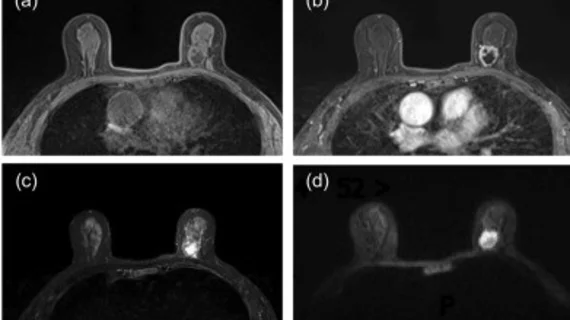Experts describe MRI characteristics of rare breast cancer
A new analysis seeking to provide an updated, in-depth overview of how a rare breast cancer presents on MR imaging was just published in Academic Radiology.
The paper describes the imaging characteristics of metaplastic carcinoma of the breast (MCB) and correlates the findings with clinical and histopathological characteristics/diagnoses—an area of research that is still largely lacking in data, authors of the paper suggested [1].
“MRI can provide valuable diagnostic information, which, combined with negative biomarker phenotype (TNBC) and less lymph node involvement rate may help improve the diagnostic accuracy of MCB,” corresponding author Haibin Shi MD, PhD, from the Department of Interventional Radiology at the First Affiliated Hospital of Nanjing Medical University, and colleagues suggested.
Researchers shared that while MCB accounts for less than 5% of all breast cancers, its diagnosis is accompanied by an increased risk of recurrence and unfavorable prognosis. Given that it is a relatively uncommon cancer, the retrospective analysis consisted of just 23 individuals (average age was 51.6) with MCB from one institution, each of whom underwent breast MRI exam prior to biopsy.
Out of 23 patients, 21 presented with a palpable mass. Out of those, 18 were visualized as an irregularly shaped mass on MRI with high signal intensity on T2-weighted images (22/23,95.7%), non-circumscribed margins (19/23, 82.6%), heterogeneous enhancement (13/23, 56.5%) and diffusion restriction (20/23, 87.0%) on diffusion weighted images (DWI).
Axillary lymph node metastasis and intramammary lymph node metastasis were not a common finding, while negative ER status, negative PR status and negative Her-2 status was reported in 87-95.7% of patients.
The authors concluded that although their findings are in line with what little prior research there is, the MRI characteristics of this rare cancer “are not so specific” and warrant further research with larger numbers of patients.
More information can be found here.

